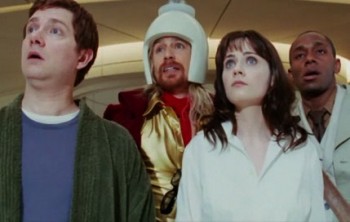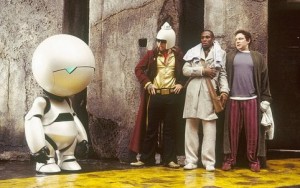|
Pull up something comfortable: a chair, a piece of carpeted flooring, your dog, whatever-and listen. I'm here to tell you that Douglas Adams, the late great Douglas Adams, was one funny guy. I first heard about his work in high school, when I overheard a couple of friends discussing some crazy-sounding shit with a vaguely sci-fi bent to it. I asked what they were talking about, and it was then that I learned of The Hitchhiker's Guide to the Galaxy. I went out and bought the first book, and about twenty seconds after beginning the first chapter, I was laughing my ass off. (Don't worry, it's back on again; in fact, I'm sitting on it right this second, just so it won't scamper off.) This promising beginning led me to the remaining books, the radio play that started it all, and the BBC television miniseries, all written by Adams and focused on the last man to escape the destruction of Earth and his wacky space adventures, all of which leave him confused and looking for a nice cup of tea. (There was also an interactive computer text game, but I was never a computer geek, so I missed that one.) About the only medium that Hitchhiker's Guide had yet to conquer was the venue of the big-screen motion picture, though Adams had been attempting to get just such a project under way for many long years by the time it finally happened. Unfortunately, he rather inconveniently died somewhere in the middle of all that, and his involvement with the film was therefore necessarily and regrettably limited to an early version of the screenplay. Unfortunate for him, what with dying being such a drag, unfortunate for those of us who loved and followed his writing and were still dying, in a less literal sense, to read more, and unfortunate for the film that finally came into being.  I really, really wanted the film to be good. After all, it would be effectively the last thing written by Douglas that we'd ever see, and on top of that it would be the version of Hitchhiker's that the larger portion of the population would be exposed to. But I'm sad to say that the film feels overall like a guitar played out of tune; you can tell there's something interesting happening in there, but it's adjusted all wrong, and there are too many lengthy solos that just fail to go anywhere. The parts that were essentially adapted straight from the original material are almost more telling than the new scenes. I've read, listened to and watched these scenes before, and many times. They're funny bits. Yet in this film they seem oddly unaffecting, as if the actors and director were completely missing what made the material funny in the first place. When the alien researcher Ford Prefect (whose full name is never heard, as it was a bit of an anachronistic joke even by the time the book came out) asks his human friend, the oblivious Englishman Arthur Dent, how he'd react if he were told that Ford was actually an alien, he still responds with the correct reply: "Do you think that it's the sort of thing that you're likely to say?" However, he now says it as if he's prodding Ford over his evasive phrasing, and not as if he were so clueless that he'd failed to realize that Ford was in fact just telling him so directly, hypothetical semantics notwithstanding. That, of course, is what made the original delivery of the line humorous, and the absence of that understanding is what makes the line in the film, the exact same piece of prose, not humorous anymore. Much of the rest of the script suffers from a "rush, rush, get on with the plot" attitude, so most of the funny lines get dropped by the wayside. Adams was a master not only at telling jokes, but in knowing how to balance the language and the bits where people are actually not speaking for maximum impact. That doesn't happen here. We don't get any "Beware of the leopard"s, or any "Do you want me to stand in a corner and rust or just fall apart where I'm standing?"s, or even any references to "Mostly Harmless," the one piece of info the titular guide had room for concerning the planet Earth. We don't get Deep Thought's incredible reticence to divulge the answer to the Ultimate Question of life, the universe, and everything. We do get an inserted romance between Arthur and Trillian (who is called by this name maybe a total of twice in the film), an old political rival of galactic president Zaphod Beeblebrox whose storyline never plays out, a happy ending that skips all the way to the fourth book, and a complete misunderstanding of the idea of the Restaurant at the End of the Universe, which is at the end of time, not the end of space. If they ever do a sequel, this screwup is totally going to bite them on the ass.  There are good parts in the film. The "sofa" scene after Arthur and Ford are rescued is flat-out hilarious, the Vogons look great, and Bill Nighy does a good turn as Slartibartfast, with a wonderful delivery of the word "threat," as if the term alone was meant to be frightening. The thought process of the whale is still funny, though the rather by-the-by explanation of the Improbablity Drive is likely to leave most initiates confused as to what that whole scene was about, anyway. The first several scenes bear more than a passing resemblance to the BBC TV series, and there are a few winking references to the show elsewhere in the film (the TV version of Marvin and Zaphod's insistence that the quarry-esque planet of Vogsphere looks just like the planet Magrathea, for example), though despite its much larger budget, it does less justice to the story. Much of the plot has been restructured to try and make for greater dramatic tension, but often this fails to fly. When the Earth's true nature is at last revealed, no one even seems to bat an eye. Zaphod's apparent complicity in the matter also fails to really be important, and the entire whopping coincidence of he and Ford, Trillian and Arthur all meeting aboard the Heart of Gold is completely undercut by setting up the fact that these characters have previously met well ahead of time, making the whole joke of the Improbability Drive pretty pointless. The Guide itself gets precious little mention, for that matter, possibly because the idea seems far less revolutionary today than when Adams wrote it three decades ago. Everyone has the Internet now, which is basically the same thing: a repository of information on virtually all known subjects which contains much that is apocryphal, or at least wildly inaccurate, and is indeed rather cheaper than a good set of encyclopedias. Douglas Adams was more than just a funny guy. He was a brilliant satirist who, in between the jokes and jabs at stuffy government bureacracy, was actually making some valid points about humanity's insistence upon trying to coax some simplistic meaning out of life and then whining when it fails to explain anything. None of this really comes across in the movie, which isn't really about much more than, in the final analysis, how great it is to fall in love with some cute chick. We don't get to see just how much Douglas really loved the Earth, and how he lamented the often feeble-mindedness of its dominant lifeform. Perhaps the greatest disservice done here is the fact that the DVD makes almost no mention of Douglas Adams, the books, the radio and TV series, or anything else to indicate that The Hitchhiker's Guide to the Galaxy ever had a life beforehand. Sadly, that's probably what most people will assume, but there's still millions of us who loved and love the writings of Douglas Adams, and will always miss him. Oh, and one piece of free advice: try putting some British actors in your British comedies. Not doing so is like making tea without putting tea in it. -review by Matt Murray
|
|
||||||||